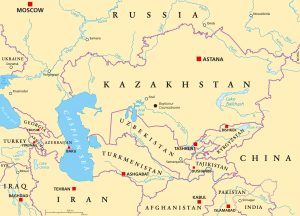Catherine Putz

In August and September, nearly 40 percent of the 800 Uzbeks queried in a telephone survey said they didn’t know about the Taliban takeover of neighboring Afghanistan.
Data from survey work conducted by Central Asia Barometer (CAB) in Uzbekistan and Kazakhstan scratch at the surface of Central Asian views of Afghanistan and the Taliban.
A majority in each country’s surveyed group were aware of the Taliban’s takeover of Afghanistan on August 15 — 66 percent in Kazakhstan and 60 percent in Uzbekistan — but those surveyed were split regarding refugees and whether the Taliban’s rise will destabilize the region.
The survey’s results are particularly interesting in that “refused” pops up as a top answer to several questions. As CAB explained to The Diplomat, “refused” was either a question-specific or topic-specific response. In other words, respondents were able to either refuse to answer specific questions after hearing them, or, when asked if they were comfortable answering questions on Afghanistan, answered “no” before hearing the questions.
When asked “should our country recognize Taliban as legitimate Afghan government?” 35 percent of the Kazakhs surveyed and 47 percent of the Uzbeks surveyed refused to give an answer.
A plurality of those surveyed in Kazakhstan — 43 percent — said the Kazkah government should not recognize a Taliban government; meanwhile, of those surveyed in Uzbekistan only 28 percent said the same. A minority in both states — 11 percent in Kazakhstan and 14 percent in Uzbekistan — said their respective governments should recognize the Taliban government.
The high rate of refusal to answer in Uzbekistan clouds interpretation of the results: Did Uzbeks refuse because they didn’t have an opinion or did they not feel comfortable stating their opinion?
Certainly, Uzbek diplomacy toward the Taliban has been more robust than that of Kazakhstan. While proximity explains Uzbek engagement with the Taliban, neighboring Tajikistan’s continued refusal to engage with the Taliban illustrates the viability of an alternate path. Nevertheless, Uzbek authorities have clearly chosen engagement.
When it comes to refugees, respondents in both states had a wide variety of opinions. In response to the question “How would you describe your anticipated flow of refugees from Afghanistan to our country if any?” the top response for both was “refused [to answer].” In Uzbekistan, following the 40 percent who refused to answer the question, 21 percent said “moderately low and low” and 20 percent said “high and moderately high.” To me this suggests some confusion regarding state positions and the anticipated flow of refugees.
Although human rights organizations have urged Uzbekistan to do more for Afghans, Uzbekistan is not a signatory to the 1951 United Nations Refugee Convention and has not been broadly accepting of refugees. Although Uzbekistan has allowed international partners to transit Afghans and others through its territory, Tashkent isn’t keen on having Afghans stay. Uzbekistan was reportedly under pressure from the Taliban to send back a large group of Afghan pilots who had fled to the country in mid-August, and under pressure from the U.S. to keep them safe until they could be moved on to a third country. The pilots were eventually taken onward to the UAE in mid-September.
Survey results regarding refugees were similar in Kazakhstan, with 34 percent refusing to answer, 29 percent stating “moderately low and low,” and 23 percent stating “high and moderately high.” The topic of refugees is sensitive in Kazakhstan, too, though largely regarding the Chinese border and Uyghurs and ethnic Kazakhs fleeing Beijing’s grasp rather than more-distant Afghanistan. Nur-Sultan froze plans to host refugees in mid-August and in mid-September joined the Russia-led Collective Treaty Security Organization (CSTO) position that placing Afghan refugees in the region was “unacceptable.”
In the final question CAB released results for — “In your opinion, what is the likelihood that the Taliban’s seizure of power in Afghanistan will destabilize our region?” — once again those surveyed in Uzbekistan largely refused to answer. Following the 49 percent who refused to answer, 31 percent said the likelihood of the Taliban’s rise to power destabilizing the region was “moderately low and very low.” In Kazakhstan, however, respondents were split with 34 percent refusing to answer and 34 percent saying the likelihood was “very high and moderately high.”
No comments:
Post a Comment